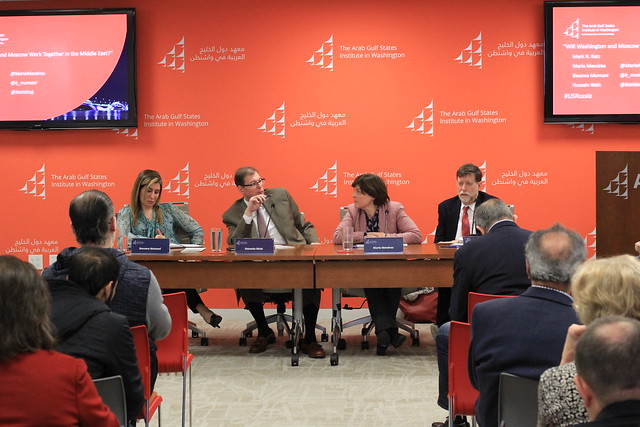Will Washington and Moscow Work Together in the Middle East?
U.S. President Donald J. Trump advocates greater cooperation with Russia, including in the Middle East.
U.S. President Donald J. Trump advocates greater cooperation with Russia, including in the Middle East. But how compatible are Russian and U.S. regional strategic goals, especially over the long run? Can the new administration simultaneously pursue cooperation with Moscow and confrontation with Tehran, given the close partnership between Russia and Iran? Will Washington identify and exploit differences between Russian and Iranian priorities, particularly in Syria? How can Gulf Arab countries adapt to this complex evolving environment and protect their own interests?
On March 6, AGSIW hosted a discussion of how the U.S. and Russian Middle East agendas converge and diverge, and how the prospect of a new level of coordination between them is viewed both in Europe and the Gulf.
Panelists:
Mark N. Katz, Visiting Scholar, AGSIW
Marie Mendras, Professor, Sciences Po
Bessma Momani, Senior Fellow, Centre for International Governance Innovation
Hussein Ibish, Senior Resident Scholar, AGSIW (Moderator)
Mark N. Katz began the discussion arguing that both the Trump administration and Russian President Vladimir Putin saw opportunities for improved U.S.-Russia relations and invoking cooperation by having the Islamic State in Iraq and the Levant as a common enemy in the Middle East. Nevertheless, overall improvement of U.S.-Russian relations will not occur, according to Katz. The United States has not fulfilled Putin’s wishes in its stance on NATO and Crimea, as well as sanctions on Russia; as such, relations have not improved. Despite the cooling of U.S.-Russian relations, Katz highlighted that Syria was also seen as an opportunity for increased cooperation. Prior to Trump’s election, Russia feared that the U.S. foreign policy agenda would promote democratization in the Middle East and Russia, but Katz believed no such fear exists with Trump, as he seems to tolerate authoritarian regimes. While fears about democratization agendas have declined, the issue of paying for the reconstruction of Syria worries Russia. Putin’s rhetoric includes naming this reconstruction a “global public good” to which everyone should contribute, as Russia would need the support of other countries.
Marie Mendras suggested that instead of Putin having a desire to stop former U.S. Secretary of State Hillary Clinton from becoming president, he could have wished to disrupt her election to provide an opportunity to show Russians that elections are unclear everywhere, in an attempt to turn down opposition toward Russia’s elections. Speaking about U.S.-Russian relations, Mendras highlighted that equal motivation from both sides is essential for cooperation. Putin has an interest in easing sanctions while Trump sees Russia as an economic and strategic way to lessen U.S. dependency on NATO, but their relations have cooled down rapidly. It is essential to understand the unpredictability of Russia’s relations worldwide, as various events, such as the Russian warplane being shot down by Turkey in Syria, have suddenly affected and altered relationships. Mendras argued that Putin is afraid of international prosecution and, having lost significant influence, wants to re-establish superpower deals with the United States, but he has failed to get Washington’s attention.
Bessma Momani then argued that Russia tries to act like a superpower although in reality it is a declining power. Russia attempts to sow chaos through misinformation and propaganda in the United States and Europe, while Putin’s tactic is far more nuanced in the Middle East, trying to fill a void left by U.S. hegemony in the Middle East. Momani argued that while Putin’s rationale for involvement in the Middle East includes fighting against Islamist radicals, Iranian-Gulf rapprochement cannot be mediated by Russia since it does not have the capabilities of a superpower. Although it has committed few troops to Syria, Russia’s military involvement has brought a great deal of global advertising for Putin and his regime, and reflects an image of Russia being a key powerbroker in Syria. Nevertheless, Russia’s exit from Syria has developed into a complex issue, as Putin attempts to exit without international prosecution.
Speakers
Support Us
Through its careful examination of the forces shaping the evolution of Gulf societies and the new generation of emerging leaders, AGSIW facilitates a richer understanding of the role the countries in this key geostrategic region can be expected to play in the 21st century.
Learn More
